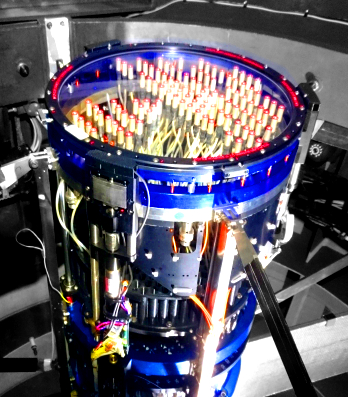Starbugs set for galaxy quest
 Australian tech experts will play a major role in an international project to measure the current expansion rate of the Universe with one per cent precision.
Australian tech experts will play a major role in an international project to measure the current expansion rate of the Universe with one per cent precision.
The Taipan survey aims to resolve a nagging discrepancy between previous measurements of the current expansion rate using measurements of the radiation left over from the Big Bang.
The new TAIPAN facility installed at one of the Australian National University (ANU) telescopes at Siding Spring Observatory near Coonabarabran has been officially launched by Assistant Minister for Science, Jobs and Innovation, Zed Seselja,
Professor Matthew Colless from the ANU Research School of Astronomy and Astrophysics and Professor Andrew Hopkins from the Australian Astronomical Observatory (AAO) will lead the Taipan galaxy survey, due to start in mid-2018, which will be the most comprehensive spectroscopic survey of the southern sky.
“The Taipan survey will map the entire southern hemisphere and part of the northern hemisphere and determine both the age and size of the Universe with extraordinary precision. To do so, it will measure the position of two million galaxies and the velocities for 100,000 of those galaxies,” Professor Colless said.
“The survey will use the ANU-owned UK Schmidt Telescope, the only telescope in the world to combine a wide field of view and a powerful spectrograph, which together make possible such an enormous survey of more than half the sky.”
The TAIPAN facility on the UK Schmidt Telescope will use a new technology involving mini robots known as Starbugs.
Developed by the AAO, the Starbugs will capture light from stars and galaxies for astronomical surveys. Professor Colless will use an ARC Linkage Infrastructure, Equipment and Facilities (LIEF) grant to grow the number of Starbugs from 150 to 300, and so double the speed of the Taipan survey.
The Starbug technology is being prototyped in TAIPAN for eventual use on the Giant Magellan Telescope in which Australia has a 10 per cent share, and which is currently under construction in Chile.
“The Taipan survey will shine light on a discrepancy that has appeared between measurements of the expansion rate of the Universe measured from the cosmic microwave background in the very early Universe and measurements done using the traditional cosmic distance ladder method in today’s Universe,” Professor Colless said.
“If we can reduce the measurements from the current 2-3 per cent precision to just 1 per cent, and if the discrepancy remains, then we may have uncovered the first chink in the standard model of cosmology for decades.”
The Australian Government has invested $7 million in the TAIPAN facility over five years. The investment includes refurbishing the UK Schmidt Telescope and building both the Starbug fibre positioning system and a powerful new spectrograph.








 Print
Print